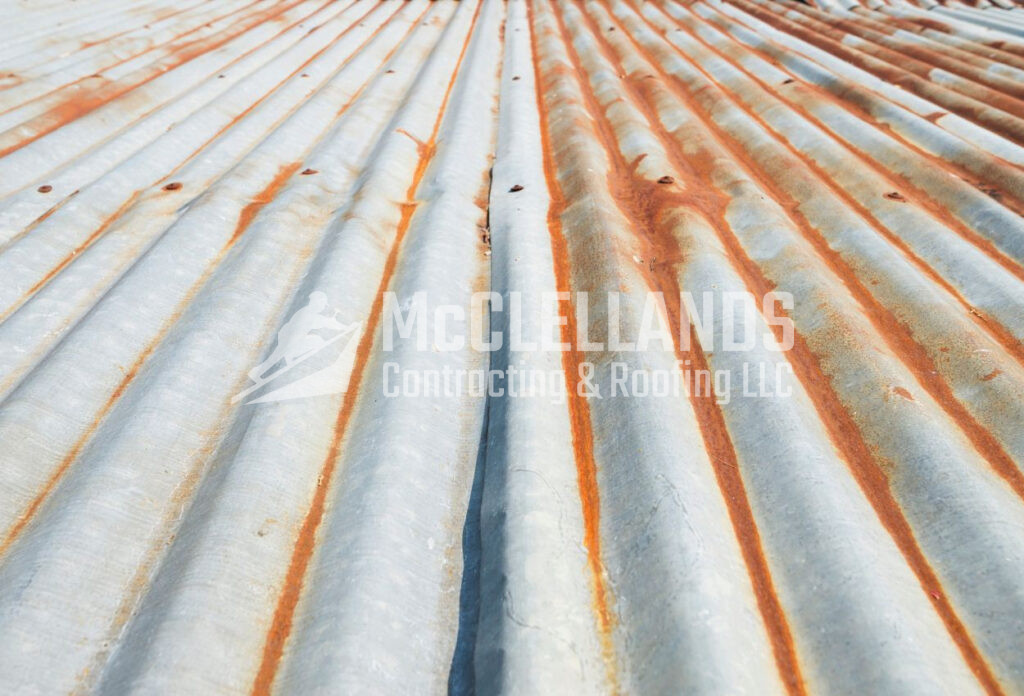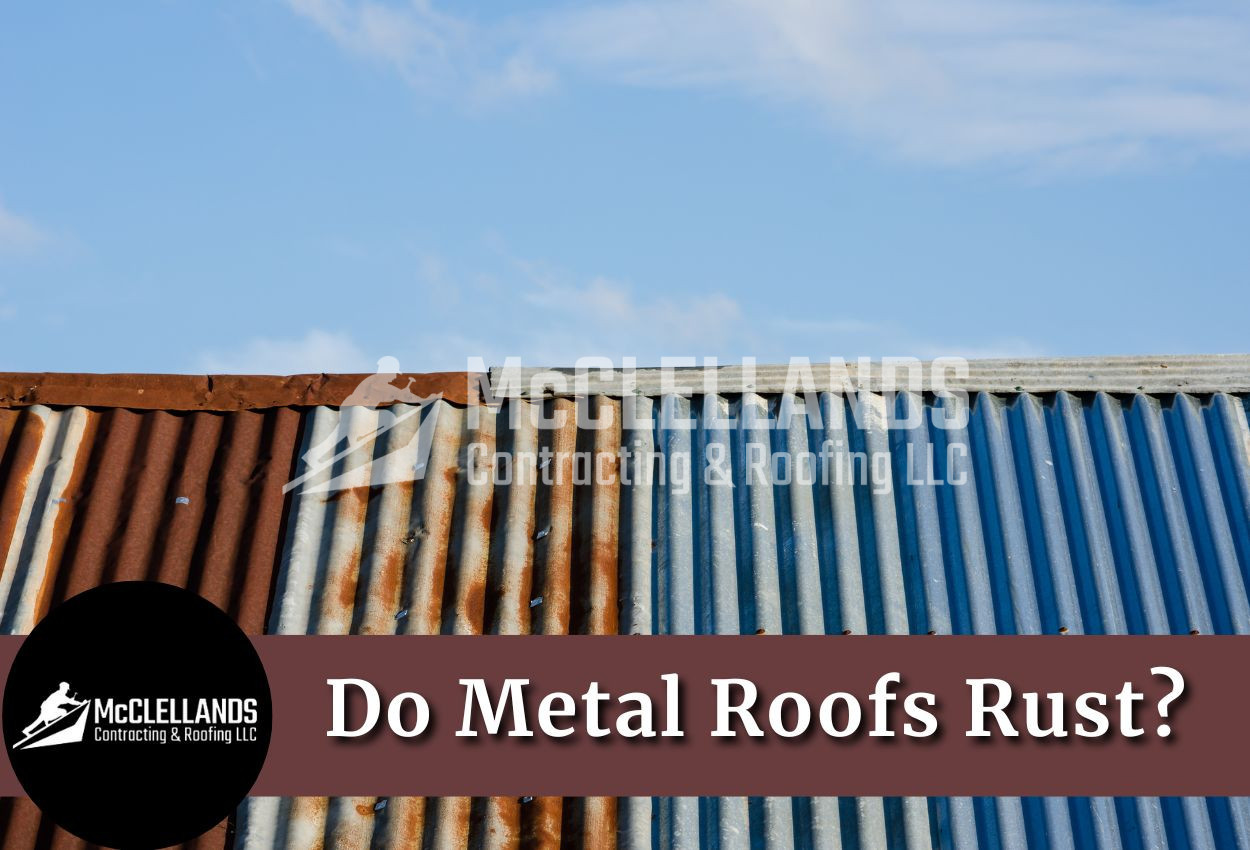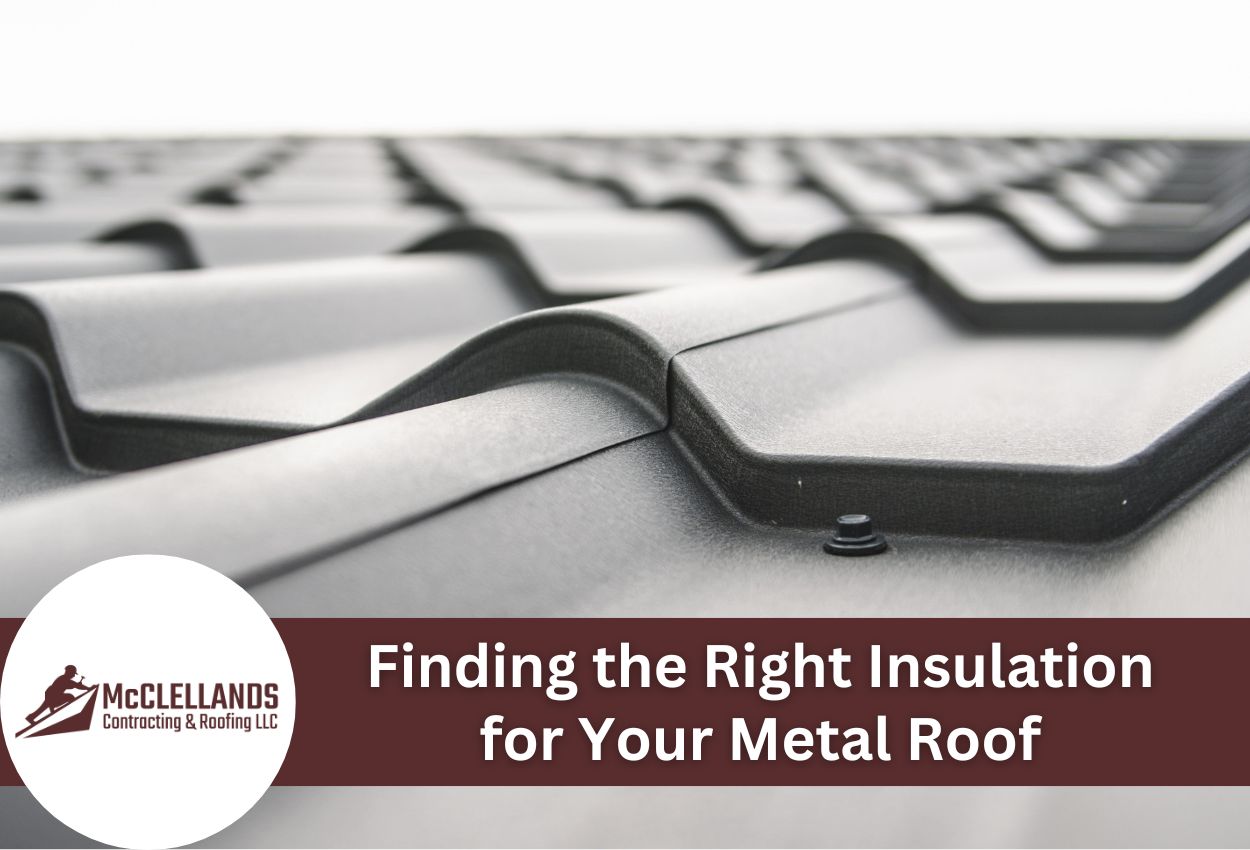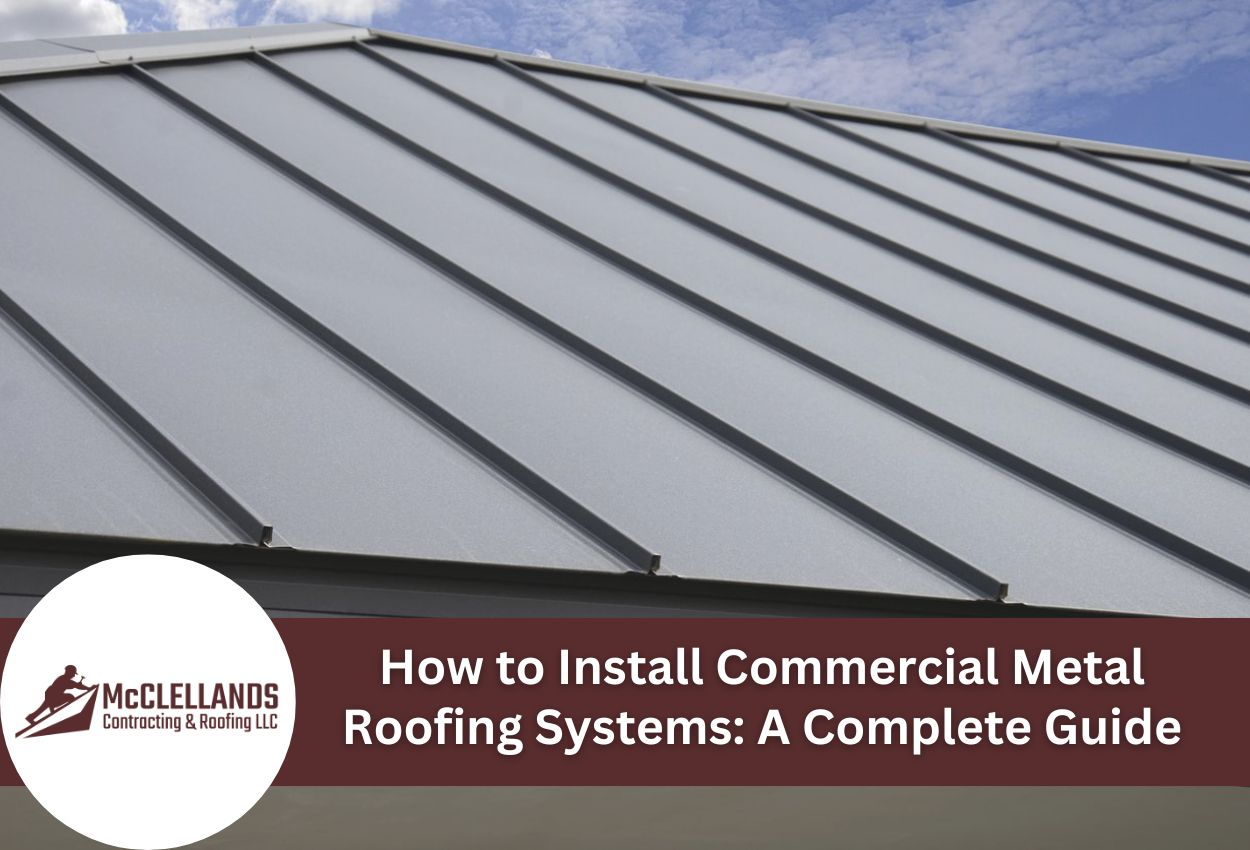You might already be aware of the performance and durability of metal roofs. But there is one common concern among property owners with metal roofs: Do metal roofs rust? Sometimes, yes metal roofs can rust.
McClellands Contracting and Roofing, LLC, is your team of local roofers serving Pittsburgh and the surrounding areas of Pennsylvania.
In today's article, we will go over when and why metal roofs rust and what steps you can take to prevent it. If you want to discuss your roofing project with our professionals in Pennsylvania, reach out to us today at (412) 353-5660.
Why Do Metal Roofs Rust?
Rust is a chemical reaction that happens when iron is exposed to both moisture and oxygen for a long period. This reaction forms iron oxide, which we commonly recognize as that reddish-brown flaky substance.
But there's an important distinction to make here: rust specifically refers to the corrosion of iron and iron alloys like steel. Not all metals rust, though many can corrode in different ways.
The rusting process begins at a microscopic level. Water molecules seep into tiny pits and cracks in the metal surface. The oxygen dissolved in this water then reacts with the iron in your metal roof, forming iron oxide.
Once this process begins, it can spread across the surface of the metal roof, potentially compromising its structural integrity over time.
Environmental effects can accelerate this process. For example, if you live in a coastal area, the salt in the air can speed up rust formation.
Similarly, acid rain, which has a lower pH level than normal rainwater, can accelerate the rusting process. Even wind can play a role by removing protective layers on the metal, exposing it to the elements.
But as we mentioned already, metal roofs don't always rust. In the next section, we will discuss which types of metal may rust over time.
Do All Metal Roofing Materials Rust?
There are a few different metal options to choose from when it comes to roofs, and not all of them are prone to rust.

#1 Steel
Steel, an alloy primarily made of iron, is naturally susceptible to rust. However, most steel roofs are treated with protective coatings to prevent rust formation. There are two common types of coated steel used in roofing:
👉 Galvanized Steel: This is steel coated with a layer of zinc. The zinc acts as a sacrificial layer, meaning it corrodes before the underlying steel does. While effective, over time this zinc layer can wear away, especially at cut edges or scratched areas, leaving the exposed steel vulnerable to rust.
👉 Galvalume Steel: This is steel coated with a mixture of zinc, aluminum, and silicon. The aluminum in the coating provides better protection against rust than pure zinc, making Galvalume steel more rust-resistant than galvanized steel.
These coatings are very beneficial for homes in coastal regions where salt spray can accelerate corrosion.
It's worth noting that during installation, contractors may cut steel panels on the roof itself, which can lead to metal shavings falling onto the roof surface. If not cleaned up, these shavings can rust, giving the impression that the roof itself is rusting. Always make sure your roofing contractor cleans up after installation to avoid this issue.
#2 Aluminum
Aluminum is inherently resistant to rust. Unlike steel, aluminum doesn't contain iron, so it can't form iron oxide (rust). Instead, when aluminum is exposed to oxygen, it corrodes in the form of aluminum oxide, a hard, transparent layer that protects the underlying metal from further oxidation.
This natural resistance to rust makes aluminum a good choice for coastal areas or locations with high rainfall.
The main drawback of aluminum roofs is the cost, which is typically higher than steel. Also, some homeowners may find its appearance less appealing for residential properties.
#3 Copper
Copper, like aluminum, doesn't rust because it doesn't contain iron. However, copper does undergo a similar process called patination. When copper is exposed to the elements, it initially turns a dull brown color due to the formation of copper oxide.
Over time, this layer transforms into copper carbonate, giving the roof a distinctive green patina, similar to what you see on the Statue of Liberty.
This patina acts as a protective layer, preventing further corrosion. Many homeowners choose copper roofs specifically for this aesthetic quality, as the patina gives the roof a unique, aged appearance.
Copper roofs are incredibly durable and can last for centuries with proper maintenance. However, they come with a premium price tag, which may not fit all budgets.
#4 Zinc
Zinc, like copper and aluminum, doesn't rust in the traditional sense. When exposed to the elements, zinc forms a protective layer called zinc carbonate. This layer, known as a patina, provides a barrier against further corrosion.
What makes zinc unique is that its patina is self-healing. If the zinc surface gets scratched or damaged, the patina will naturally reform over time, resealing the exposed area.
This self-healing property makes zinc roofs exceptionally durable and low maintenance.
While zinc roofs are highly resistant to corrosion and can last for many decades, they can be quite expensive and may not suit all architectural styles.
How Do You Get Rust Off A Metal Roof?
Now that you know which type of metal rusts and which types do not, here we will discuss how you can treat a rusting metal roof.
👉 Pressure Washing
Pressure washing is often the first step in treating a rusting metal roof. This method effectively removes loose rust, dirt, and debris from the surface. However, it's important to use the appropriate pressure setting to avoid damaging the metal or removing protective coatings.
For best results, use a pressure washer with at least 2,000 PSI (pounds per square inch) capability, but start with a lower setting and adjust as needed.
Add a rust-removing detergent to the pressure washer for more effective cleaning. Always spray in the direction of the metal panels, not against the seams, to prevent water from being forced under the panels.
After pressure washing, allow the roof to dry completely before proceeding with any other rust removal methods or protective coatings.
👉 Chemical Rust Removers
Chemical rust removers can be highly effective for treating rust on metal roofs. These products work by dissolving the rust through a chemical reaction, making it easier to clean or remove.
When selecting a chemical rust remover, choose one specifically designed for metal roofs. Apply the product according to the manufacturer's instructions, typically using a brush or sprayer. Most products require sitting for a certain amount of time to effectively dissolve the rust.
After application, thoroughly rinse the roof with clean water to remove all traces of the chemical. It's important to wear appropriate protective gear, including gloves, eye protection, and a mask when working with chemical rust removers because they can be acidic.
👉 Wire Brushing And Sanding
Mechanical methods like wire brushing and sanding may be necessary for stubborn rust spots that pressure washing and chemical treatments can't fully remove. These methods physically remove the rust by scraping it off the surface.
Use a wire brush attached to a drill for larger areas or a hand-held wire brush for smaller spots. For very stubborn rust, you might need to use sandpaper or a sanding block. Start with a coarser grit and move to a finer grit for a smoother finish.
Be careful not to apply too much pressure, as this can damage the metal or remove protective coatings. After wire brushing or sanding, wipe the area clean with a damp cloth to properly remove all rust particles.
👉 Apply Rust Converter
Rust converters are products that chemically change rust into a stable compound that prevents further rusting. Unlike rust removers, which dissolve rust, converters react with the rust to create a protective layer.
Apply the rust converter directly to the rusted areas using a brush or sprayer. Allow it to dry completely according to the manufacturer's instructions, generally 24 hours. Once dry, the converted rust will typically appear black.
Rust converters can be useful for areas with extensive rust that would be difficult to remove completely. They provide a stable base for protective coatings.
👉 Apply Protective Coatings
After removing or converting the rust, it's essential to apply protective coatings to prevent future rusting. The type of coating will depend on the type of metal and the specific conditions the roof is exposed to.
For steel roofs, consider a zinc-rich primer followed by a high-quality metal roof paint. For aluminum, copper, or zinc roofs, specific coatings designed for these metals may be more appropriate.
Apply the coatings in thin, even layers using a brush, roller, or sprayer. Multiple coats may be necessary for optimal protection. Allow each coat to dry completely before applying the next, and follow the manufacturer's recommendations for drying times and application conditions.
Regular inspection and maintenance, including reapplication of protective coatings, as needed, can extend the useful life of your metal roof and prevent future rust problems.
Also Read: The 3 Main Types Of Gutters For Metal Roofs
Get Professional Metal Roofing Services in Pennsylvania
At McClellands Contracting and Roofing, LLC, we are your local and trusted roofing company serving Pittsburgh and the surrounding areas of Pennsylvania. We understand that no matter what type of roof you have, expert workmanship is important.
We provide high-quality roof repairs, installation, and replacements. Our team is here to help you choose the best type of roofing material for your home’s needs, preferences, and budget.
Whether metal roofs or simple asphalt shingles, our professionals can handle it. We want to be the only name that comes to your mind for roofing and home improvement projects, and we never compromise on the quality of our work.
To schedule a free roof inspection or to discuss your project with our professionals, call us today at (412) 353-5660.




